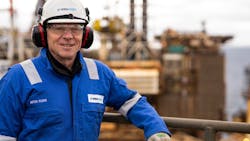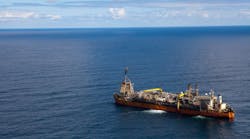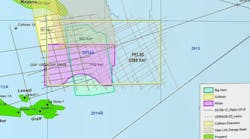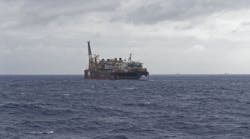Editor's note: This article first appeared in the 2023 Executive Perspectives Special Report, which published within the November/December 2023 issue of Offshore magazine.
By Mitch Flegg, Serica Energy
The UKCS is a mature hydrocarbon basin with production having declined by 70% since 2000. Yet it remains a very sizeable sector producing about 1.5 MMboe/d, contributing about 1.5% of total UK gross added value and supporting more than 200,000 UK jobs. As with any maturing offshore basin, however, operators have the challenge of fixed costs being borne by a falling level of production.
Given the importance of the UK offshore sector, therefore, it is regrettable that policymakers keep scoring own goals, with the imposition of the Energy Profits Levy (EPL)—a tax on all profits rather than a windfall tax—followed by an increase in the EPL rate and a failed attempt at mitigating the damage with the Energy Security Investment Mechanism. Most recently, the NSTA’s “OGA Plan” consultation document points to a risk in placing too much emphasis on electrification as a means of reducing emissions, potentially causing both economic harm to the country and squeezing out more realistic routes to the main objective.
Given this, it would be naïve to argue against the UK offshore oil and gas industry being in a difficult place. Nonetheless, I believe that there is space for oil and gas companies to be profitable in the UK, albeit in ways that mean the country is not benefiting fully from the sector’s potential.
Clearly, the current fiscal regime and regulatory uncertainty encourages a short-term investment strategy. Serica by design has an asset portfolio that includes multiple investment opportunities across its two independent production hubs: Bruce and Triton. During this year and through 2024, we are prioritizing well work, mainly on the Bruce Field, and infill drilling in the Triton area, with all activities aimed at resulting in incremental production in the short term with project payback achieved in months rather than years. The economics of these projects are largely shielded from regulatory and fiscal uncertainties, require relatively low levels of risk capital—especially on a post-tax basis—and can be profitable despite punitive tax rates.
Serica and Tailwind, with which we combined this year, have already had success with this approach in recent years with, for example, a new Rhum production well, a well intervention campaign on Bruce, a fourth infill well on Gannet E and the development of the Columbus and Evelyn fields. Importantly, these projects have boosted production and added reserves without significant increases in CO2 emissions because they utilize existing infrastructure.
We have a sanctioned program of similar short-cycle investments in the near term and a hopper of further potential investments in the longer term. We are, however, cautious about committing to projects with very high levels of upfront capital expenditure given the significant uncertainties around the future tax regime, licencing and emissions regulation. So, although the sorts of projects Serica is undertaking during the next 18 months, and considering undertaking in the years that follow, can deliver healthy returns, we are an exemplar of an industry reluctant to invest in major new "anchor" developments. The UKCS basin needs larger projects alongside the incremental ones. Both can fit within the parameters of the North Sea Transition Deal.
Politicians of all persuasions looking to govern constructively, regulators and the industry each have a part to play in identifying sensible approaches to making the most of an industry that remains a key part of the UK energy mix and, it is worth noting, a huge contributor to the Exchequer, responsible for some 15% of the total UK corporation tax payments in the last tax year. This is, of course, not easy and trade-offs are inevitable. I am, however, optimistic that through listening as much as talking, we will avoid unnecessary "own goals."









